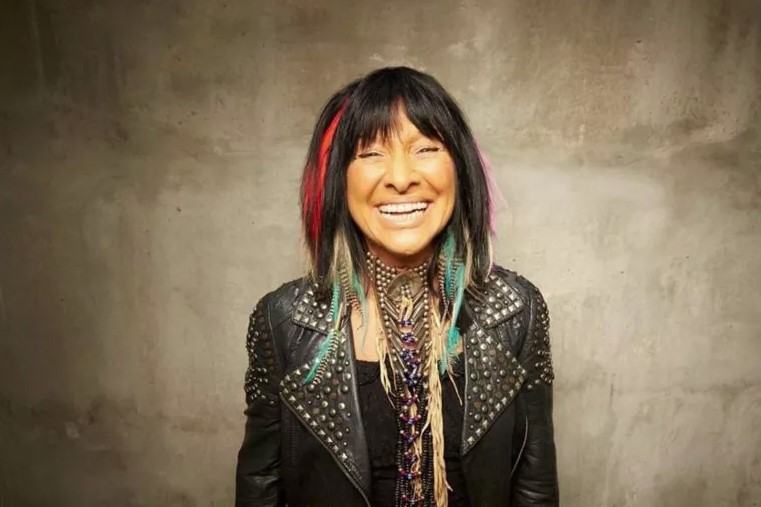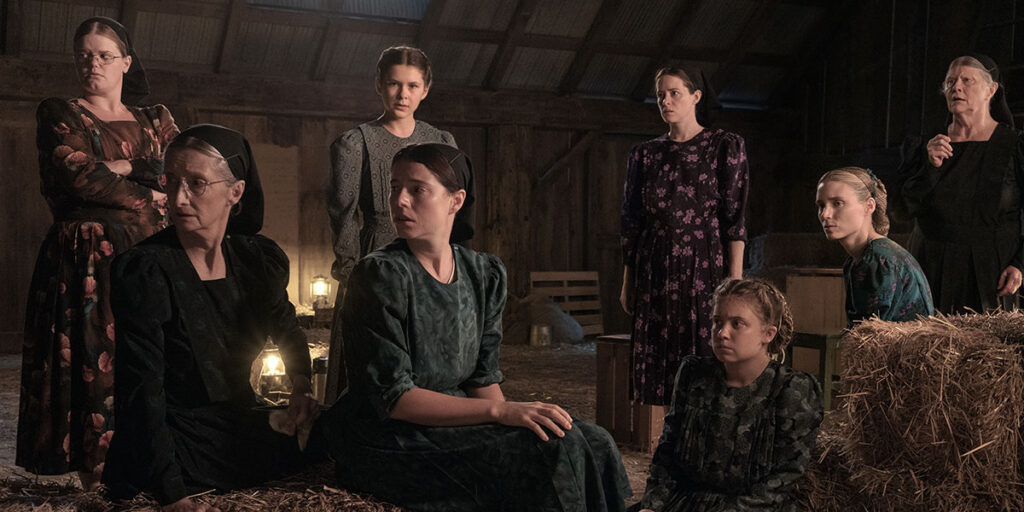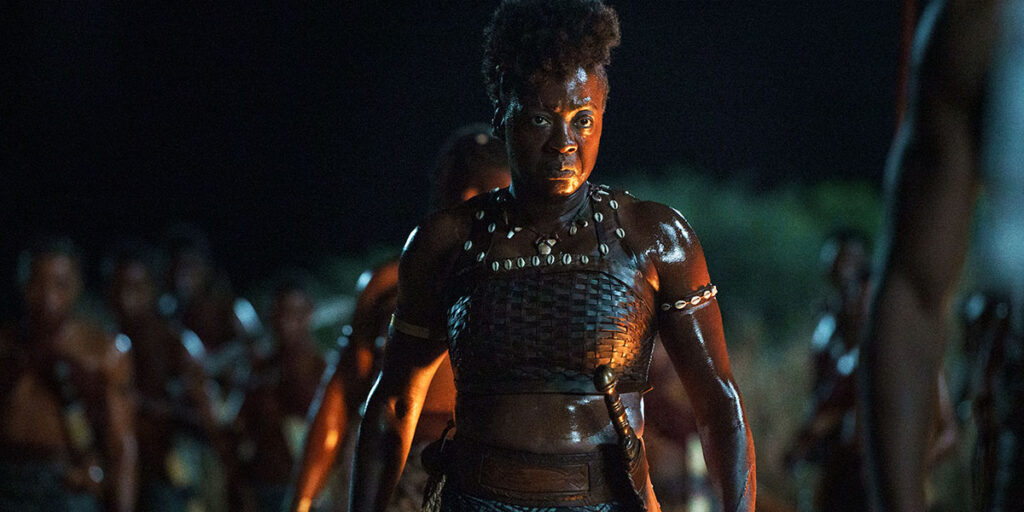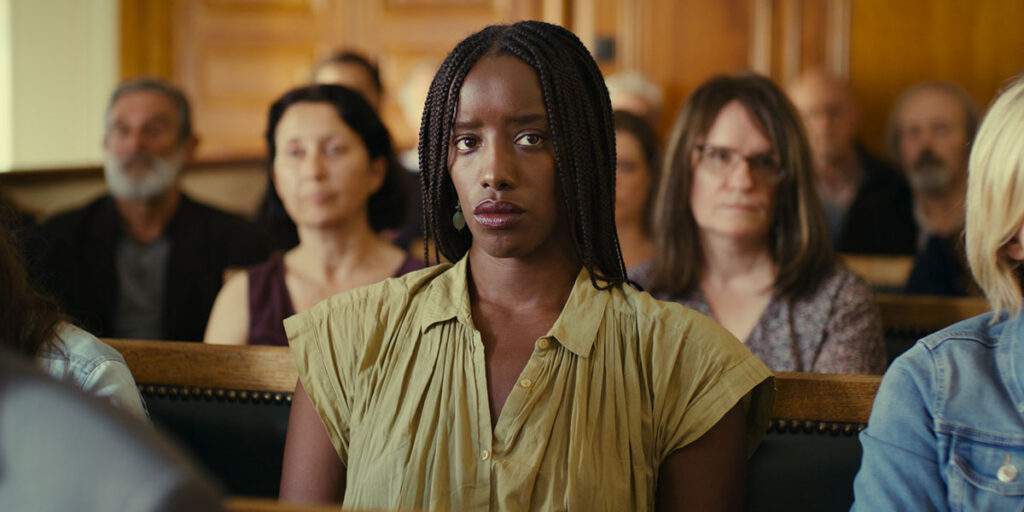Summer is winding down just as chatter about awards contenders is starting to heat up. The 46th edition of the Toronto International Film Festival (TIFF) is nearly upon us, and the fest’s People’s Choice Award is considered a precursor to Oscar nominations, with many winners going on to snag Best Picture. Some of our most anticipated women-directed titles screening this year include a historical epic led by Viola Davis (“The Woman King”), a drama that tackles sexual assault in a religious community (“Women Talking”), and a documentary about an Indigenous singer-songwriter who’s made waves in the music industry and beyond (“Buffy Sainte-Marie: Carry It On”). Below is a collection of some of the films we’re most looking forward to checking out at this year’s fest. This list is by no means exhaustive — other titles on our radar include Sanaa Lathan’s directorial debut, “On the Come Up,” a coming-of-age story about an aspiring hip-hop star, and “The Grab,” the latest documentary from “Blackfish” helmer Gabriela Cowperthwaite.
TIFF takes place September 8-18. Plot synopses are courtesy of the fest.
“Buffy Sainte-Marie: Carry It On” (Documentary) – Directed by Madison Thomas; Written by Madison Thomas and Andrea Warner

“Buffy Sainte-Marie: Carry It On”
What it’s about: The life, music, and activism of legendary Indigenous singer-songwriter Buffy Sainte-Marie are explored in this documentary that is as captivating as its subject, who smashed through barriers to become an inspiration to fans and fellow musicians alike.
Why we’re excited: The first and only Indigenous Canadian to win an Oscar, Buffy Sainte-Marie is an icon whose music and activism make her a trailblazer in more ways than one. The self-taught musician, who counts Joni Mitchell and Bob Dylan among her most famous fans, took home an Academy Award in 1983 for Best Original Song for “An Officer and a Gentleman’s” “Up Where We Belong,” which she co-wrote. The “Universal Soldier” singer was the first recurring Indigenous guest star on “Sesame Street,” and helped pave the way for inclusion. When she appeared on the NBC series “The Virginian” in 1968, “she demanded the producers hire Indigenous actors,” TIFF details. Taking a stand in her industry meant making enemies along the way — including the FBI. “Buffy Sainte-Marie: Carry It On” promises to celebrate a groundbreaking artist and shed light on the causes she’s helped bring attention to on the world stage.
“Catherine Called Birdy” – Written and Directed by Lena Dunham
What it’s about: A 13th-century teenager (Bella Ramsey) rebels against her father (Andrew Scott) when he tries to marry her off to a wealthy man, in Lena Dunham’s playful adaptation of Karen Cushman’s bestselling novel.
Why we’re excited: “Game of Thrones” star Bella Ramsay plays another headstrong medieval noblewoman in Lena Dunham’s long-in-the-works passion project “Catherine Called Birdy” — and she’s giving tween girls the adventure-filled non-fairytale they so deserve. Giving off major “Disenchanted” or “Ever After”-minus-the-romance vibes, “Catherine Called Birdy” is irreverently honest about how very un-Disney life was for young women like Birdy, from the literal grit and grime, to the danger of being married off on a male guardian’s whim. Featuring an all-star cast, including Billie Piper and Sophie Okonedo, we hope “Catherine Called Birdy” is a feminist folktale mothers can feel good about showing their daughters.
“Emily” – Written and Directed by Frances O’Connor

“Emily”
What it’s about: This boldly atmospheric portrait of “Wuthering Heights” author Emily Brontë — the directorial debut from veteran actor Frances O’Connor — is a tale of creativity, secret desire, and a woman’s arduous journey toward self-actualization in 19th-century England.
Why we’re excited: Best known for her on-screen appearances in series and films such as “The Missing,” “AI,” and “Mansfield Park,” Frances O’Connor steps behind the camera for “Emily,” a look at the life of the author behind one of the most beloved books of all time, “Wuthering Heights.” We’ve seen plenty of Catherine and Heathcliff in film and TV adaptations of Emily Brontë’s only novel, but we’re keen to see Brontë’s own story play out on the screen. If Apple TV+’s “Dickinson” taught us anything, it’s that, in the right hands, entertainment about authors from centuries past can still feel totally fresh. Plus, we’re eager to see Emma Mackey lead a period pic — it’ll be a major departure from her breakout role in “Sex Education.”
“In Her Hands” (Documentary) – Directed by Tamana Ayazi and Marcel Mettelsiefen
What it’s about: In the months leading up to the Taliban takeover in 2021, Afghanistan’s youngest female mayor, Zarifa Ghafari, deals with danger, uncertainty, and personal turmoil.
Why we’re excited: Documentaries about women running for, or holding, political office often underscore how stacked the system is against them — “Surge,” “To the End,” “All In: The Fight for Democracy,” “Represent,” etc. That’s the case in “In Her Hands,” but directors Tamana Ayazi and Marcel Mettelsiefen capture a political moment and place that’s especially hostile toward women in positions of power. The film follows young mayor Zarifa Ghafari for the year-and-a-half leading up to Kabul’s fall, as her country shifts around her and her progressive views on human rights make her a target. “In Her Hands” isn’t just a reminder of what is happening in Afghanistan, it’s a sobering examination of the misogyny and danger women politicians face all over the world.
“The Swimmers” – Directed by Sally El Hosaini; Written by Sally El Hosaini and Jack Thorne
What it’s about: This soaring epic dramatizes the true story of two sisters who left their home in war-torn Syria for a new life in Europe — and the chance to compete in the 2016 Summer Olympics.
Why we’re excited: For such a tough (you use every muscle in your body while being denied oxygen!), beautiful sport, not too many films focus on swimming as competition, let alone swimming as a means of survival. TIFF-opener “The Swimmers” does both: it’s the true story of Syrian sisters, both elite swimmers (played by real-life sisters Manal Issa and Nathalie Issa), who swam a sinking dinghy of fellow refugees to Greece, and eventually made it to the 2016 Olympics. It promises to be an uplifting story of triumph, a drama about an ongoing human rights crisis, and, one of our personal favorites, a celebration of women athletes.
“Women Talking” – Written and Directed by Sarah Polley

“Women Talking”
What it’s about: Rooney Mara, Claire Foy, Jessie Buckley, and Judith Ivey, with Ben Wishaw and Frances McDormand, star in Sarah Polley’s fearless adaptation of Miriam Toews’ acclaimed novel about a cloistered world where women struggle with an epidemic of abuse.
Why we’re excited: Ten years after the release of her last film, “Stories We Tell,” a DGA-nominated doc exploring her family history, Sarah Polley is coming back to the big screen. “Women Talking,” her third narrative feature, and her most recent since 2011 Michelle Williams-starrer “Take This Waltz,” sees the Canadian actor-turned-filmmaker adapting Miriam Toews’ novel about women reckoning with sexual abuse in a remote Mennonite colony. With the film’s award-winning source material, powerful premise, and star-studded cast, Polley seems poised to make a splash this awards season.
“Bones of Crows” – Written and Directed by Marie Clements
What it’s about: An epic account of the life of Cree matriarch Aline Spears that spans generations, Marie Clements’ “Bones of Crows” is a powerful indictment of the abuse of Indigenous peoples as well as a stirring story of resilience and resistance.
Why we’re excited: We’re big fans of “Night Raiders” and “The Legend of Molly Johnson,” two films directed by Indigenous women that use genre tropes to revisit the historical subjugation of Indigenous peoples, and how they fought back. Even though it isn’t a sci-fi or a Western, “Bones of Crows” promises to do something similar. A period drama, the film follows a Cree woman, Aline Spears (played at different ages by Summer Testawich, Grace Dove, and Carla Rae), as she is stolen from her family and placed in a residential school, puts her language skills to use in the military during WWII, and, much later in life, gets a shot at something resembling justice. Period films, WWII films particularly, are a dime a dozen, but they don’t often focus on women of color, who were — newsflash — also a part of history. “Bones of Crows” bucks the trend by spotlighting an Indigenous female character, using her story to recount the brutality, and beauty, her real-life counterparts experienced.
“The Woman King” – Directed by Gina Prince-Bythewood; Written by Dana Stevens

“The Woman King”
What it’s about: Featuring a thrilling performance from Oscar winner Viola Davis, this epic tale brings to life the true story of the Agojie, the all-female military regiment charged with protecting the embattled African Kingdom of Dahomey.
Why we’re excited: Gina Prince-Bythewood’s last pic, “The Old Guard,” was a record-breaking success for Netflix, and gave us the opportunity to see Charlize Theron and KiKi Layne playing immortal mercenaries. Now, Prince-Bythewood is back with another female-led genre pic, and this time, it’s Viola Davis’ turn to kick ass. The Oscar winner leads women warriors and takes on European colonizers in “The Woman King,” which promises to be action-packed and celebrate the power of women, all while highlighting a chapter in history that’s been overlooked.
“Saint Omer” – Directed by Alice Diop; Written by Alice Diop, Amrita David, and Marie NDiaye

“Saint Omer”
What it’s about: In this extraordinary narrative debut by acclaimed documentarian Alice Diop, a young novelist is forced to confront her personal traumas as she observes the trial of a woman accused of infanticide.
Why we’re excited: “Excited” might not be the right word, as “Saint Omer” looks to be a devastating story about two women coming to understand just how extensively their lives have been impacted by racism and xenophobia. However, we know that director Alice Diop has a stellar track record of compassionately, carefully exploring these themes in her documentary work, including “On Call” and “We” — and we’re confident she’ll continue to do so in her first narrative feature. Using a courtroom setting, the myth of Medea, and two characters who are on opposite sides of the law — yet are startling similar — “Saint Omer” is a story that will likely haunt us long after we’ve left the theater.







